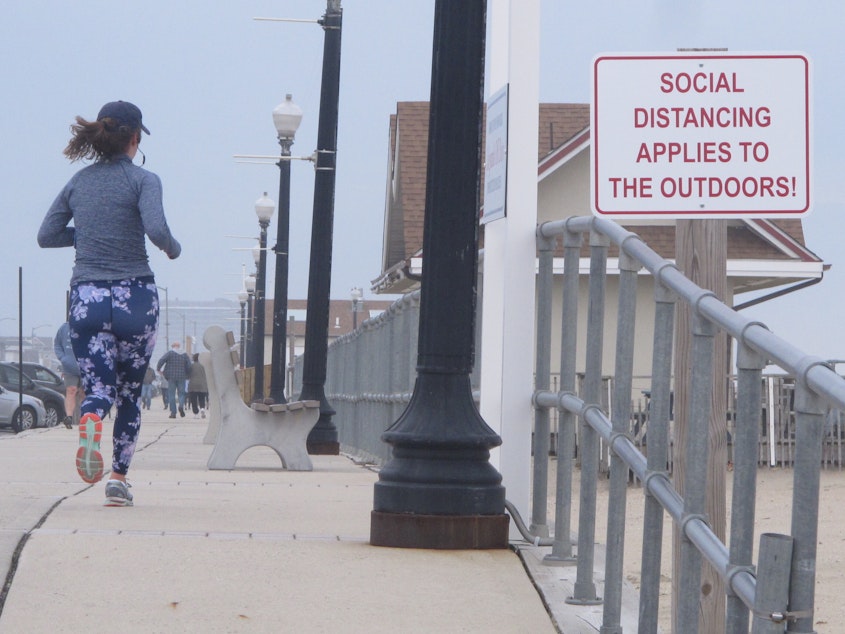Ohio, Louisiana, Delaware Order Residents To Stay Home As Cases Of COVID-19 Rise

Ohio, Louisiana and Delaware became the latest states on Sunday to announce statewide stay-at-home orders as the toll from the coronavirus outbreak grew to more than 31,000 cases and 390 deaths.
Updated at 8:52 p.m. ET
With the announcements, more than 101 million Americans are either currently under — or will soon be under — state orders to remain at home in an effort to slow the outbreak. That is equal to roughly 31% of the nation's population.
In addition to Delaware, Louisiana and Ohio, similar policies are either in place or will soon take effect in California, Connecticut, Illinois, New Jersey and New York.
The United States now has the third-largest number of confirmed cases, behind China and Italy, respectively. As testing capabilities expanded over the past week, the number of confirmed cases in the U.S. continued to climb.
Sponsored
Facing a surge in cases, the Ohio Department of Health and Gov. Mike DeWine signed a statewide stay-home order for the state's 11.7 million residents. The order requires residents to remain in their homes until at least April 6, but allows exceptions for activities like buying groceries or to seek out medical care. The state has reported 351 confirmed cases and three deaths.
"We are now at a new stage," DeWine said on Twitter.
In Louisiana, home to a population of 4.6 million, Gov. John Bel Edwards followed suit, with stay-at-home measures effective Monday at 5 p.m.
Louisiana has reported 837 cases and 20 deaths.
"Bottom line is we're in a race against time when it comes to this coronavirus and its rapid spread in Louisiana," Edwards said at a press conference Sunday.
Sponsored
In Delaware, Gov. John Carney ordered residents to stay at home and closed all non-essential businesses starting Tuesday.
"This was not an easy decision, but it's the right decision to protect the safety of Delawareans and Delaware families," Carney said.
Connecticut Gov. Ned Lamont announced a "Stay Home, Stay Safe" order for that state on Saturday.
So too did New Jersey Gov. Phil Murphy. There are more than 1,000 cases of COVID-19 in New Jersey and 16 people have died, according to the state's website.
In a video, the governor said all gatherings should be canceled, including weddings, funerals and birthday parties.
Sponsored
"I don't take this action lightly, but my goal is to make sure you can gather safely with family and friends later," Murphy said.
Murphy ordered all nonessential retail businesses to indefinitely close their physical stores to the public at 9 p.m. Saturday. Essential businesses, including grocery stores, pharmacies, restaurants offering takeout and delivery, banks, gas stations and other limited exceptions, are allowed to stay open.
"You can still take a walk outside, go buy groceries or get takeout from the local restaurant you want to support. But if you do, continue to practice social distancing," Murphy said. "But otherwise we need you to stay at home. This is no time for business as usual."
In a tweet, Murphy urged residents not to go to their Jersey Shore beach homes and instead stay at their primary residences.
"The local infrastructure, especially the health care infrastructure, is not prepared for the influx of part-time residents," Murphy said.
Sponsored
In Hawaii, Gov. David Ige ordered a mandatory 14-day quarantine for anyone arriving in Hawaii, including tourists and returning residents. The mandate goes into effect Thursday.
Italy's grim milestone
Worldwide, confirmed total cases of COVID-19, the disease caused by the coronavirus, surpassed 300,000 worldwide over the weekend, according to data from Johns Hopkins University.
Italy has reached a grim milestone with its death toll — now exceeding 4,800 deaths, which is larger than the death count reported in China, where the disease was first diagnosed.
In response to the record-setting numbers, Italy is shutting down all production facilities except those essential to maintaining the nation's supply chain.
Sponsored
In the northern Lombardy region, one of the worst-affected areas in Italy, officials took more extreme steps on Sunday, ordering all guests out of hotels, which will now be used only for emergency purposes, and banning all outdoor sports and exercise activities. [Copyright 2020 NPR]



